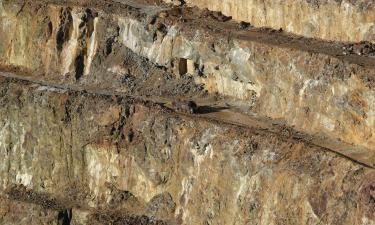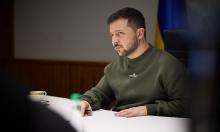Russian Oligarchs To Be Liquidated
The process has been launched and it cannot be stopped
It has become clear against the background of recent events that the history of the Russian oil giant Yukos is coming to its end. Neither new American top managers, nor Western politicians can help to save the company. All these events are logical: liquidation is a natural process.
The newspaper of the Russian government, the Rossiyskaya Gazeta, has recently published an interview with Vitaly Artyukhov, Minister for Natural Resources. In the interview, the minister was talking about the authorities of his department. Probably, the details of the interview have turned out to be an unpleasant surprise for some people. According to the Russian law, the ministry has a right to withdraw natural wealth development licences from any company, if licensing terms are violated.
The powerful American company ExxonMobil has recently had such an experience, when it failed to obtain the licence for the development of the Sakhalin-3 project. The British company Shell is also on the list. Furthermore, the ministry has started the large-scale investigation against Yukos and its branch companies. The investigation is still on, but Vitaly Artyukhov has already said that the issue of withdrawing all Yukos's licences has been settled. The question was touched upon about a year ago, when no one was thinking about Mikhail Khodorkovsky's arrest. The minister believes, a company with the arrested control shareholding is not a good partner for the licensing department.
It was rumored last summer that Vitaly Artyukhov would soon be dismissed from the position. It seemed that Mikhail Kasyanov's government disliked his ideas, because the government was presumably aimed at the needs of large business in the field of natural wealth extraction and sales. Artyukhov started the investigation with the Russian oil giant LUKoil and the state-owned company Gazprom. As a result, numerous violations of the environmental law have been revealed.
LUKoil has managed to avoid the trouble with the help of its links in the government. Gazprom did not notice any trouble at all, as it seemed. Yet, the Russian Audit Chamber published shocking results of the investigation: branch companies of the gas monopoly often work without any state licences.
Kremlin officials paid attention to Vitaly Artyukhov's policy - the minister has managed to gain the support in the Kremlin. The struggle for the Talakan crude and gas deposit in the republic of Yakutia is a bright example to prove it. Russia's largest private companies tried to win the deposit, but the ministry canceled the tender twice. Russian oil oligarchs complained to Energy Minister Igor Yusufov and Prime Minister Mikhail Kasyanov. However, the ministers could not do anything about it. As a result, the interim licence for the development of the Talakan deposit was withdrawn from the Yukos-controlled company Lenaneftegaz. It was handed over to the state-friendly company Surgutneftegaz.
At present, Minister Artyukhov says that his ministry is intended to conduct the process of preventive withdrawal of licences with other oil companies too. Indeed, Russian media have been paying a lot of attention to "barbaric extraction methods" that both domestic and foreign companies use chasing lower costs and higher profits.
Furthermore, it is not only the Ministry for Nature that deals with the oil companies working in Russia. The list of state agencies includes: the Office of the Prosecutor General, the Audit Chamber, the Revenue Ministry. It is clear that the state policy about the given economic branch has been changed fundamentally. To crown it all, Russian State Duma deputies help the above-mentioned structures too. Deputy Vladimir Yudin has recently told reporters at a press briefing that Yukos had the "control stock" in the parliament for all legal initiatives regarding the natural wealth. One may not doubt that Russian oligarchs will never be as powerful and influential as they were before.
Mr. Yudin is not intended to stop, although his authorities of a deputy are running out in about a month. The deputy has already submitted an inquiry to the Russian Office of the Prosecutor General about the incorrect privatization of the oil company Sibneft. The deputy demands Sibneft's control shareholding should be arrested (Sibneft has recently merged with Yukos). The deputy has also submitted an inquiry regarding the gas-extracting company Rospan, which is owned by Yukos and TNK (TNK is now a part of BP). The deputy is certain that the unique enterprise has been cynically stolen from Gazprom during the pawn auctions time. "We suggested TNK should confess the amount of funds taken away from the state. The company did not respond to our offer," the deputy said. It goes without saying that the refusal can cost a lot to the Russian owners of TNK and their British partners.
Vladimir Yudin accused newly-appointed Yukos's head Semyon Kukes of concentrating Russia's entire oil industry in his hands. The deputy believes that it was Kukes's prime goal in Mikhail Khodorkovsky's company. "We must return to this issue," the deputy insists. One may not doubt that Russian law-enforcement and supervising agencies will treat Yudin's initiative with understanding. In addition, Vladimir Yudin is not alone at this point. Too many people have suffered from merciless methods of Boris Yeltsin's oligarchs.
The people of Roman Abramovich, Mikhail Khodorkovsky, Vagit Alekperov's teams have moved to another team craving for revenge. Andrey Vavilov, former deputy finance minister, owner of the control stocks of the company Northern Oil (Severnaya Neft), currently a Federation Council senator, has recently called upon the Office of the Prosecutor General to institute criminal proceedings against all Russian oil tycoons. Vavilov believes, they deceive the state using one and the same schemes, they do it in agreement.
Apparently, Mr. Vavilov knows what he is talking about. Such large companies as LUKoil, Yukos and Sibneft have been pressing him for many years, trying to make him sell the company on their own conditions. Northern Oil and its owner were saved owing to Vavilov's agreement with the state company Rosneft. Now Andrey Vavilov is a proponent of the state's tough policy toward oligarchs.
Maybe, starting the fight with the Russian authorities, Khodorkovsky was hoping for the support of his friends in the US. However, the former CEO of Yukos has become a favorite in the West just recently. Someone has probably offered him help. About three or four years ago, Mikhail Khodorkovsky was their sworn enemy in Russia. Yukos did not let foreign companies access the Russian crude. Furthermore, Yukos forced them to get rid of small shareholdings that they had managed to obtain. Probably, Mikhail Khodorkovsky and other Russian oil tycoons have managed to make friends with several influential Western businessmen during the recent years.
Oligarchs-owned Russian media outlets have been providing a lot of information about the delight of foreign investors regarding the business that they run with Russians. Yet, Western businessmen do not feel shy in front of their journalists. Bill Browder, CEO of Moscow-based Hermitage Capital said in an interview to the Financial Times that a well-governed authoritarian regime is better than the oligarchic mafia regime. Hermitage Capital has been working for more than ten years in Russia. The company prefers to cooperate with the state-owned Gazprom and Sberbank. One shall assume, Western businessmen are expecting the complete destruction of the class of Russian oligarchs.
The destruction will definitely take place - one may not have any doubts about it. First of all, the repressive mechanism to redistribute the national wealth has been launched and it is dangerous to stop it. Secondly, if the process is suspended, the present Russian government will be dramatically defeated, it will lose its followers too.
Subscribe to Pravda.Ru Telegram channel, Facebook, RSS!





